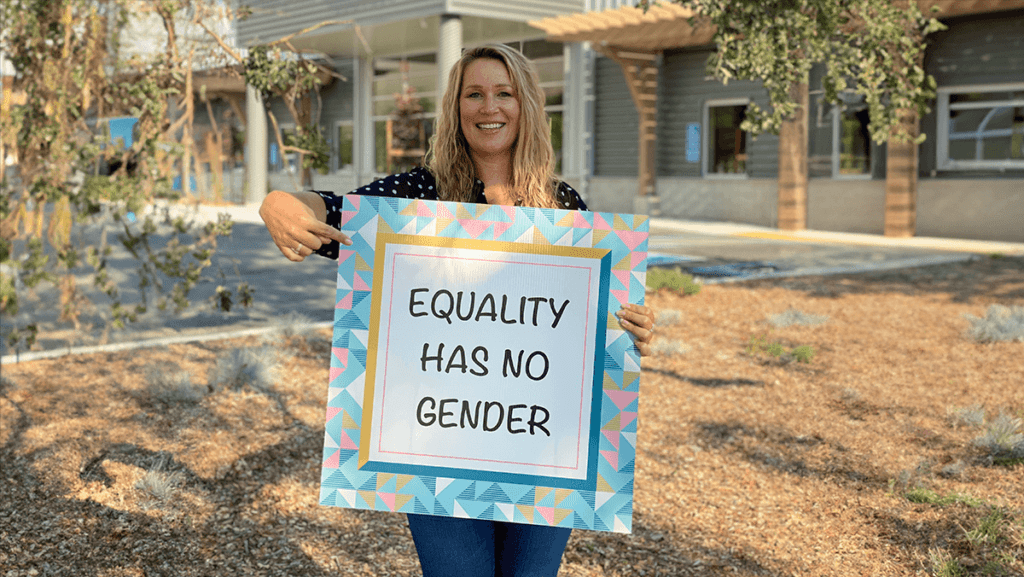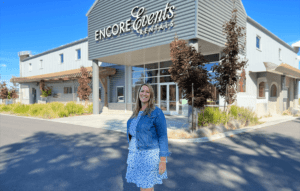Bridget Doherty is the co-owner and president of Encore Events Rentals, a premier events rental company in Northern California, with three locations serving Wine Country and the San Francisco Bay Area. She is also the co-owner of Cal-West Rentals, a full-service heavy equipment company. She’s been an entrepreneur for 24 years and a Founder for nearly 14. In this exclusive piece for Follow the Founder, Bridget talks about building a team, company culture, and the benefits of owning a business.
Advice on Successfully Growing Your Team
Bridget started her entrepreneurship journey straight after finishing college in 2001. Her brother and she inherited Cal-West rentals from their father, a small company at the time. Later on, in 2010, they opened Encore, her current main occupation. Throughout the years, both companies have grown immensely. We asked Bridget what was most important to successfully grow the team.
“Our work in Encore is seasonal. We have 100 permanent full-time employees and up to 150 in the high seasons.”
“Having a stable Human Resource team was crucial. We now have an HR department of three people. But not that long ago, maybe five years ago, our HR was a part-time person in accounting. This is common for smaller businesses: you either outsource HR and payroll or someone in the accounting division does a little bit of HR. We did that for close to 18 years. Looking back, it was very difficult.
“The sooner you have a strong HR, the sooner you can more easily grow and manage your team.”
Without a strong HR on your side, the job of managing people and resources falls onto the leader. The stress is even higher when you have to manage a company with a changeable number of employees.
“The second piece for us was the seasonality of our work. We hire so many people seasonally that two or three years ago, one of our HR positions was to do recruitment for six months each year. Having someone to do that 40 hours a week for 6 months immensely improved our recruiting efforts.”
Innovative Employee-Oriented Culture
According to Adam Grant, a renowned organizational psychologist and author, people-centric culture within an organization has a long list of benefits including higher employee retention rates, increased engagement and productivity, better customer relations, and higher employee well-being and work satisfaction. While some of these might be logical to expect, an interesting perk of prioritizing your employees is also increased innovation within the company. Grant explains this is due to fostering a feeling of understanding and support, which makes people feel at ease and prompts them to share their ideas and collaborate more freely.
Being a leader of a business that mainly caters to people, it’s no surprise that Bridget’s main incentive is centered around prioritizing others: whether it’s her employees or Encore’s clients. She is a real proponent of putting your employees first. This has led her to introduce benefits into her company that truly help her team grow.
“My personal value statement is centered around supporting our team. We have been offering scholarships for our team for the local colleges for a while, probably 10-15 years now. Two years ago, we added scholarships for our employees’ children.
We’ve just introduced something brand new. It’s an idea I’ve worked hard to realize. We want to create a first-time home buyer program to help employees with their first home. We can’t offer large amounts, but enough to help with closing and moving costs.”
Bridget has gone to incredible lengths to support her team. Introducing a homebuyer support program is an incredibly innovative perk, something no other businesses do. We delve a bit deeper to understand how she got the idea.
“It’s something I’ve been thinking about for a few years. I talked to the accountant and my financial planner to make sure I didn’t need to create a non-profit to do it. That took a couple of years to figure out. There were some more things we organized, such as how to fit it within Encore’s business of operations. We found some financial courses to assist our employees, too. Going through basic one to two hours of financial courses around things such as budgeting when you buy your first home educates you so much as a first-time buyer. This is especially true if you’re the first person in your family to buy a home. So I’m excited for all that. I will be even more excited when we have our first employee who’s able to take advantage.”
Personal Benefits of Being a Founder
Having discussed the benefits she creates for her team, we now ask Bridget about the benefits she experienced as a Founder.
“The biggest benefits for me are the same as the hurdles, it just depends on the side of the coin. The main one is freedom.”
“At times, that has been highly impacted. You have to put in the hours being physically in the office and then count the brain space your business is taking up outside of the office. During my first 15 years in business, I was working 60-70 hours a week and wasn’t resentful about it. I was okay with it. But then I started hitting a wall. So I told myself, ‘You cannot keep working at that pace. Something has to change.’ ”
Self-awareness plays a big role in deciding to change. No matter how much others tell you that you need to attend to something, unless you realize what the problem is and feel the need to take action, it will never happen. This is true with any big changes you undertake. This self-awareness prompted Bridget to change how she approached her work life.
“I’m still attached to answering emails, but I can do it in or out of the office. So the positive side of that is as I’ve rounded that corner. Now I have freedom both with regards to where and when I’m working. I can travel more and still be connected. I have a great team who handles the day-to-day stuff wonderfully without me. But it’s been a process to get to that point.”
Long hours and dedication often pay off at the beginning of building a company. At some point, however, you have to transition that work from you to a team to sustain the business and its growing needs. For more stories, inspiration, and advice from new to very seasoned Founders, follow us on Follow the Founder. You can also find us on Instagram or LinkedIn.
Want to Keep Reading?
The Human Network: Matthew O. Jackson
How our sometimes hidden positions in various social structures—our human networks—shape how we think and behave, and inform our very outlook on life.































